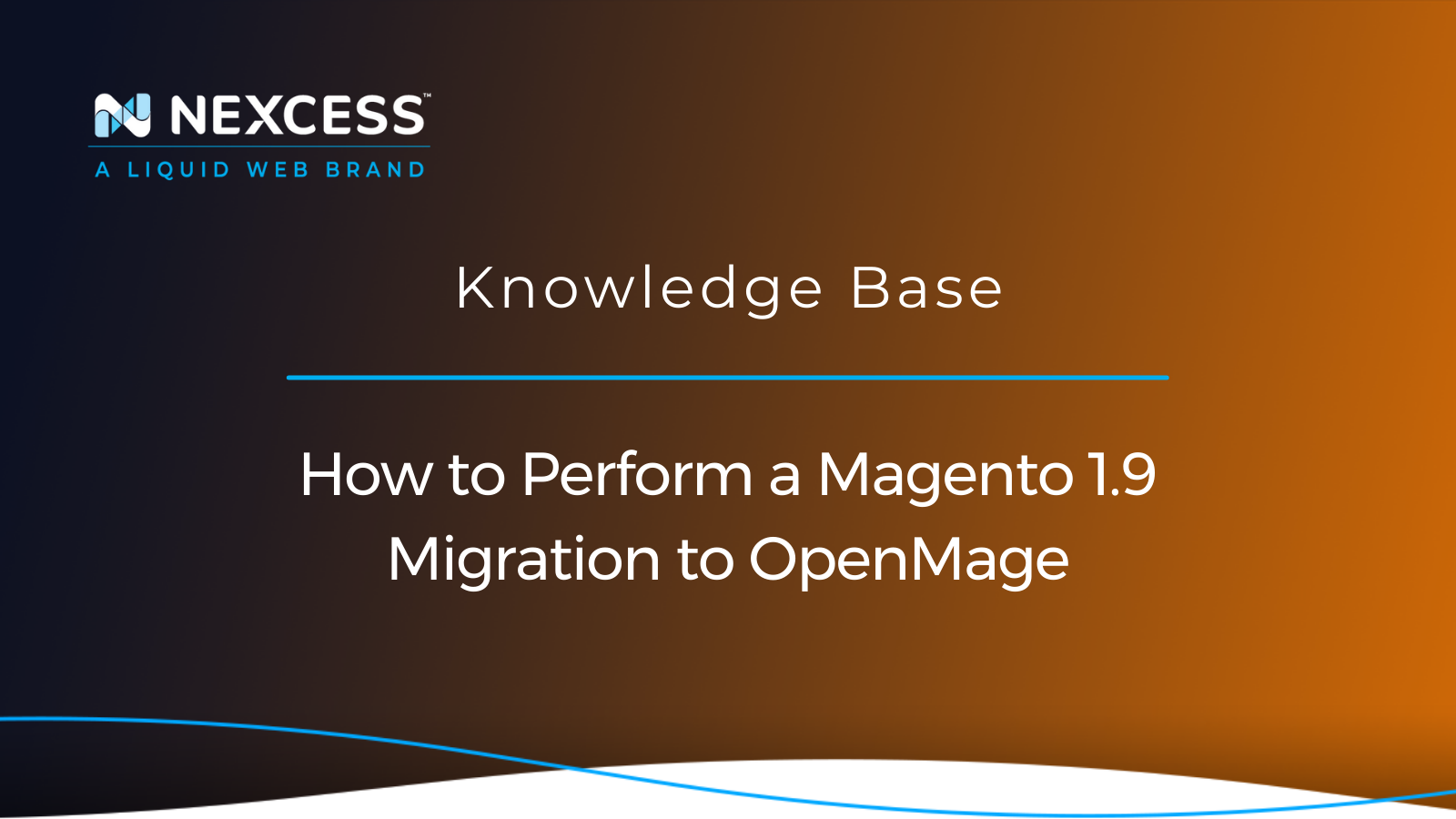OpenMage an open source "fork" of the original Magento 1.9 code that aims to maintain Long Term Support (LTS) and PCI compliance for existing Magento 1.9 sites.
Magento 1.9 Migration to OpenMage Long Term Support (LTS)
Magento 1.9 users have hopefully heard that their Content Management System (CMS) was sunset back in 2020. However, there are still some 40,000 live stores that process their orders through this now unsupported platform. A Magento 1.9 migration to OpenMage LTS helps to solve these issues.
Can Ecommerce Websites Still Use Magento 1?
Adobe announced in September 2018 the end of support for the Magento 1. x release line for both the Magento Commerce and Magento Open Source versions as of June 30, 2020.
What is OpenMage LTS?
OpenMage LTS is a Magento 1 fork, which started in 2009 based on Magento 1.1.1. OpenMage is also the name of the company behind the community-based open-source project.
Why Should I Migrate from Magento 1.9?
Security should be at the forefront of everyone’s mind when running an online store. Unfortunately, Magento 1.9 has received no security patches for over two years since its end-of-life in June 2020 and is therefore vulnerable to numerous security flaws discovered in the code since that time, both known and unknown.
Regulatory or PCI compliance is another critical factor that should sway you from Magento 1.9. With no security updates, PCI scans against the site may fail, and the only way to correct this shortcoming is to leave Magento 1.9 for something more secure.
Not only are there security changes that could be patched in the code of this CMS, but also optimization changes to help sites run faster or more efficiently and look better to boot, making optimal use of server resources. Unfortunately, with no updates to this aging platform, improving site performance or taking advantage of new technologies becomes a problematic task.
Why Should I Use OpenMage?
We know that your site took a long time to develop, and you have created a brand image for yourself and your store as well. Therefore, maintaining your existing site is crucial, and making Magento 1.9 work for you as long as possible is to your advantage. One of the best ways to mitigate the risks or pitfalls outlined earlier is to change to a community-supported version of Magento called OpenMage.
OpenMage is an open source "fork" of the original Magento 1.9 code that aims to maintain Long Term Support (LTS) and PCI compliance for new or existing Magento 1.9 sites. This implementation also aids compatibility with existing Magento 1.9 plugins or add-ons. The team developing the fork includes some dedicated Magento developers, but in addition to this, anyone who can solve problems with the project is welcome to contribute code. Over 1000 issues have already been patched and deployed!
And best of all, it’s completely free! There is a simple Magento 1.9 migration that needs to take place on your Magento installation to swap out the core code of the site, and you will be patched and secure for years to come.
What Other Options Exist?
Even though OpenMage is a tremendous and free product, it is unofficial and community-driven, meaning that there are no guarantees of functionality or structured support mechanisms available, which may not be suitable for every site owner.
Safe Harbor
Nexcess customers using Magento 1.9 can leverage a product called Safe Harbor for Magento 1, which adds extra layers of security around your platform to protect it from common attacks to this CMS. This extra security can aid your PCI compliance and ensure a safe environment for payment processing, although its lifetime is also limited. But, it can be added to existing Nexcess Magento 1.9 installations with little to no effort required on your part.
Magento 2.x
Upgrade migrations from Magento 1.9 to the supported Magento 2.x branch can potentially be both extremely time intensive and extremely costly because of radical changes to the core operations in Magento. In addition, making this change to the Magento 2.x branch requires the input of technologists and site developers to ensure that your existing content and configurations will work correctly in the new Magento core. However, this is the ideal solution for customers who are looking to keep the Magento experience alive for their customers in the long term.
This move advantageously unlocks access to all Magento 2.x extensions and functions, like mobile friendly themes, additional payment gateways, and more robust security, all enhancing your store’s capabilities. If this type of switch sounds like it may be for you, we can put you in contact with our development partners that work specifically with Magento upgrade migrations.
How to Migrate from Magento 1.9 to OpenMage
Migrating from the Command Line
So you want to perform a Magento 1.9 migration to OpenMage!
Here’s what you need to do before we get started:
- Check your Magento version. It would be best if you were running the free Magento Community Edition (CE) 1.3.3.0 or greater. If you paid for Enterprise Edition, or if you are using an Alpha or Beta release, the upgrade script will not work for you.
- Make a development copy of your website. It would be a best practice to always attempt significant changes to your site on a test version first before applying them to your live store. Anything that goes sideways could cause downtime or loss of data, so it’s best to try it in a safe environment first. Once we test the script, this copy can be destroyed.
- Get shell access to your site. The Magento 1.9 migration is run on the command line in the main directory of your Magento site.
Now that we have all of this information ready let’s get the migration underway.
Command Line: Migraration Step #1
Connect to the terminal of your development site through SSH, and navigate to the document root of your site.
Command Line: Migraration Step #2
Run the command:
curl -fsSL https://migrate.openmage.org | sh
Command Line: Migraration Step #3
This command will download and run the OpenMage migration script. It checks the available programs and lets you know if you are missing anything. If you are, ask your hosting provider to enable access to the applications the script asked about. Specifically, it will need Git, wget, and curl, each of which should generally already be available.
Command Line: Migraration Step #4
The command asks for a quick confirmation that it is about to apply the patches for OpenMage. Once you confirm, the patching takes a minute or two to complete.
Command Line: Migraration Step #5
Check through the development copy of the site you just patched, and make sure that everything is still working as you expect. You will want to inspect your frontend, your store and products, the admin area, the checkout flow, and any special plugins or custom code you have added to the site. If you need to make any corrections here, make notes about the changes you made so that you can make the same changes on the live site later.
Once the check is complete, we can migrate the live store. Select a time when you expect traffic to be low and temporarily suspend orders before taking a full site backup and running the same steps as above.
Migrating with Git
If you manage your site files with Git, we can perform the Magento 1.9 migration another way. The same rules apply as far as versioning: only Magento CE 1.3.3.0 and higher versions can be migrated to OpenMage.
Git: Migraration Step #1
Make a new "migration" branch for your site:
git checkout -b migration
Git: Migraration Step #2
On this branch, we will add a new upstream repository for OpenMage:
git remote add upstream https://github.com/OpenMage/magento-lts.git
Git: Migraration Step #3
Next, we fetch from this new upstream repository:
git fetch upstream
This prints out all of the available tagged versions of OpenMage that we can merge into our Magento 1.9 code.
Git: Migraration Step #4
Select the highest available version (19.4.6 at time of writing) and use it to rebase your code:
git rebase -X theirs upstream/19.4.6
Git: Migraration Step #5
Resolve any conflicts in the rebase by adding and committing conflicting files as needed. For example, this usually happens when customizations were made to the core files.
Git: Migraration Step #6
When you have resolved conflicts, then you can commit, push, and deploy your code. Finally, clear the cache on the Magento site, and you are ready to roll!
Migrating with Composer
Many developers choose to use Composer to deploy their sites, as it is a simple way to include other libraries of code. If you fall into this category, you can add a few lines to your required stanza, then deploy as normal:
{
"require": {
"aydin-hassan/magento-core-composer-installer": "*",
"openmage/magento-lts": "19.4.6"
},
"extra": {
"magento-core-package-type": "magento-source",
"magento-root-dir": "htdocs"
}
}
Get Started With Managed Magento Hosting From Nexcess
If you are looking for a suitable Magento hosting plan for your website, you are in the right place. At Nexcess, we offer optimized ecommerce hosting solution built for speed, security, and scale. You can find the available Fully Managed Magento Hosting plan on the Nexcess website.
We also install Magento 2 for our customers as per their requirements using our own customized nkmagento2 command from our side. In addition, our skilled team provides 24/7/365 support and monitoring services so that you can focus on your websites. Contact our team today to learn more.
Related Articles
- Magento 2 Nexcess Knowlesge Base
- Magento 2 Hosting
- Nexcess Scope of Support - Magento 2
- The Ultimate Magento 2 Checklist for Performance
- Magento 2 Optimized - Ebook
- How to enable Elasticsearch for your Nexcess Cloud account
- How to configure Magento 2 to use Elasticsearch
- How to use Elasticsearch with ElasticPress
- Magento 2 Help



